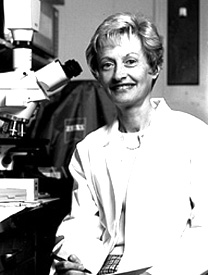Our Science – Arthur Website
Diane C. Arthur, M.D.
 |
|
|||||||||||||||||||||
Biography
Dr. Arthur received her M.D. from Case Western Reserve University in 1976. Following training in pediatrics and pediatric hematology/oncology at the University of Minnesota, she joined the School of Medicine faculty at the same institution. She served as director of the Cytogenetics Laboratory and attending physician in pediatric hematology/oncology from 1980 to 1996. Dr. Arthur joined the NCI Laboratory of Pathology in November 1996. She has established the Clinical Cytogenetics Section, which conducts diagnostic laboratory services, resident and fellow training, and research in cytogenetics.
Research
Cancer Cytogenetics
Dr. Arthur's past research has focused on the clinical and biological significance of acquired chromosome abnormalities in cancer, with an emphasis on hematologic malignancies. Dr. Arthur was one of the first to describe the clinical features and prognostic significance of the t(4;11)(q21;q23) in acute lymphoblastic leukemia, and she has continued to publish on rearrangements of chromosome band 11q23 with her colleagues in clinical medicine, epidemiology, and molecular biology at the University of Minnesota and in the Children's Cancer Group and Cancer and Leukemia Group B. Drs. Arthur and Bloomfield were the first investigators to report the association of abnormalities of chromosome 16 with a specific morphologic subtype of acute myelogenous leukemia, now called M4Eo, and a good prognosis. Dr. Arthur has also coauthored seven publications of one of the largest series of cytogenetic analyses of non-Hodgkin's lymphomas in the literature, and correlations of cytogenetics with clinical, morphologic, and immunophenotypic features of these lymphomas. She has participated extensively in national and international cooperative group studies of cancer cytogenetics, including the Children's Cancer Group, the Cancer and Leukemia Group B, and the Fourth, Fifth, and Sixth International Workshops on Chromosomes in Leukemia, which have unequivocally demonstrated the diagnostic and prognostic significance of karyotype in acute leukemias, non-Hodgkin's lymphomas, and childhood solid tumors. In part as a result of the findings of these studies, diagnostic karyotyping has become the standard of care, and is now used in planning therapy for patients with these malignancies.
Since joining the NCI Laboratory of Pathology, Dr. Arthur has established her new research program in cancer cytogenetics. The focus of this research is the use of routine as well as new molecular cytogenetics techniques, including comparative genomic hybridization (CGH) and multicolor spectral karyotyping (SKY), to define chromosomal abnormalities that may be important in tumor initiation or progression.
Dr. Arthur is currently participating in several collaborative research projects. One of these is a study of B-cell chronic lymphocytic leukemia (B-CLL). To address the questions of timing of karyotypic changes in the course of B-CLL, and the possible specificity and significance of these changes, she is conducting prospective serial studies of patients with B-CLL referred to the NCI for evaluation and possible treatment. The cytogenetic-specific aims of this project are: to determine the optimal culture conditions for obtaining karyotypically abnormal mitotic cells from peripheral blood of patients with B-CLL; to determine whether or not interphase fluorescentin situ hybridization (FISH) detects clonally abnormal cells missed by G-banded metaphase analysis; to determine whether or not CGH will detect gains or losses of chromosomal material not found by metaphase or FISH analyses; to correlate cytogenetics results with clinical, morphologic, and immunophenotypic features of the disease; and to correlate karyotype with cDNA microarray analysis of gene expression. These studies have the potential to define new clinicopathological subsets of B-CLL patients, and they may reveal associations of karyotype with abnormal gene expression in these patients.
Dr. Arthur has recently introduced CGH and SKY technologies into the cytogenetics research laboratory. Her future research plans include molecular cytogenetic analyses of B-CLL, inherited bone marrow failure syndromes, and other rare hematologic malignancies to discover the specific cytogenetic changes in these disorders, and when in the course of the diseases they occur.
This page was last updated on 7/15/2008.

